Browse the Library
 Cosmos Carl Sagan Sagan explores 15 billion years of cosmic evolution and the development of science and civilization.[6] He traces the origins of knowledge and the scientific method, mixing science and philosophy, and speculates about the future of science.[7] He also discusses the underlying premises of science by providing biographical anecdotes about many prominent scientists, placing their contributions in the broader context of the development of modern science.
Cosmos Carl Sagan Sagan explores 15 billion years of cosmic evolution and the development of science and civilization.[6] He traces the origins of knowledge and the scientific method, mixing science and philosophy, and speculates about the future of science.[7] He also discusses the underlying premises of science by providing biographical anecdotes about many prominent scientists, placing their contributions in the broader context of the development of modern science. 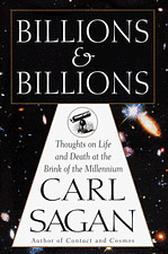 Billions & Billions Carl Sagan The book is a collection of essays Sagan wrote covering diverse topics such as global warming, the population explosion, extraterrestrial life, morality, and the abortion debate. The last chapter is an account of his struggle with myelodysplasia, the disease which finally took his life in December 1996. Sagan's wife, Ann Druyan, wrote the epilogue of the book after his death.
Billions & Billions Carl Sagan The book is a collection of essays Sagan wrote covering diverse topics such as global warming, the population explosion, extraterrestrial life, morality, and the abortion debate. The last chapter is an account of his struggle with myelodysplasia, the disease which finally took his life in December 1996. Sagan's wife, Ann Druyan, wrote the epilogue of the book after his death. 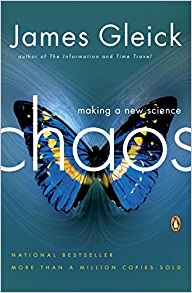 Chaos James Gleick Chaos introduces a whole new readership to chaos theory, one of the most significant waves of scientific knowledge in our time. From Edward Lorenz's discovery of the Butterfly Effect, to Mitchell Feigenbaum's calculation of a universal constant, to Benoit Mandelbrot's concept of fractals, which created a new geometry of nature, Gleick's engaging narrative focuses on the key figures whose genius converged to chart an innovative direction for science. In Chaos, Gleick makes the story of chaos theory not only fascinating but also accessible to beginners, and opens our eyes to a surprising new view of the universe.
Chaos James Gleick Chaos introduces a whole new readership to chaos theory, one of the most significant waves of scientific knowledge in our time. From Edward Lorenz's discovery of the Butterfly Effect, to Mitchell Feigenbaum's calculation of a universal constant, to Benoit Mandelbrot's concept of fractals, which created a new geometry of nature, Gleick's engaging narrative focuses on the key figures whose genius converged to chart an innovative direction for science. In Chaos, Gleick makes the story of chaos theory not only fascinating but also accessible to beginners, and opens our eyes to a surprising new view of the universe. 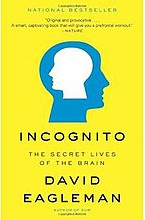 Incognito - The Secret Lives of the Brain David Eagleman If the conscious mind - the part you consider to be you - is just the tip of the iceberg, what is the rest doing?' This is the main question throughout the entirety of the book.
Incognito - The Secret Lives of the Brain David Eagleman If the conscious mind - the part you consider to be you - is just the tip of the iceberg, what is the rest doing?' This is the main question throughout the entirety of the book. 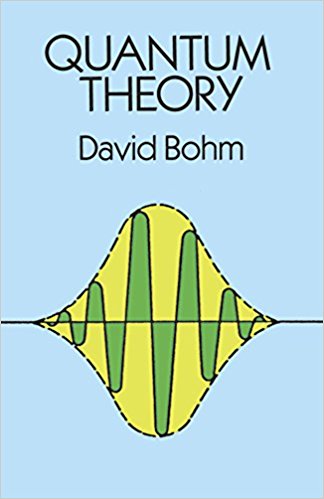 Quantum Theory David Bohm This superb text by David Bohm, formerly Princeton University and Emeritus Professor of Theoretical Physics at Birkbeck College, University of London, provides a formulation of the quantum theory in terms of qualitative and imaginative concepts that have evolved outside and beyond classical theory. Although it presents the main ideas of quantum theory essentially in nonmathematical terms, it follows these with a broad range of specific applications that are worked out in considerable mathematical detail.
Quantum Theory David Bohm This superb text by David Bohm, formerly Princeton University and Emeritus Professor of Theoretical Physics at Birkbeck College, University of London, provides a formulation of the quantum theory in terms of qualitative and imaginative concepts that have evolved outside and beyond classical theory. Although it presents the main ideas of quantum theory essentially in nonmathematical terms, it follows these with a broad range of specific applications that are worked out in considerable mathematical detail. 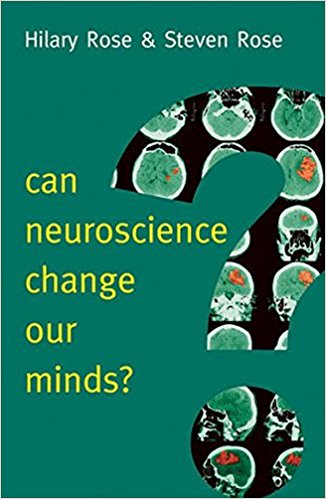 Can Neuroscience Change Our Minds Hilary Rose Neuroscience, with its astounding new technologies, is uncovering the workings of the brain and with this perhaps the mind. The 'neuro' prefix spills out into every area of life, from neuroaesthetics to neuroeconomics, neurogastronomy and neuroeducation. With its promise to cure physical and social ills, government sees neuroscience as a tool to increase the 'mental capital' of the children of the deprived and workless. It sets aside intensifying poverty and inequality, instead claiming that basing children's rearing and education on brain science will transform both the child's and the nation's health and wealth.
Can Neuroscience Change Our Minds Hilary Rose Neuroscience, with its astounding new technologies, is uncovering the workings of the brain and with this perhaps the mind. The 'neuro' prefix spills out into every area of life, from neuroaesthetics to neuroeconomics, neurogastronomy and neuroeducation. With its promise to cure physical and social ills, government sees neuroscience as a tool to increase the 'mental capital' of the children of the deprived and workless. It sets aside intensifying poverty and inequality, instead claiming that basing children's rearing and education on brain science will transform both the child's and the nation's health and wealth. 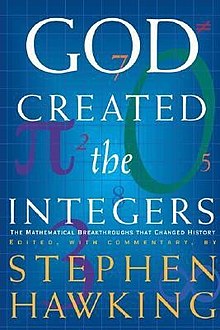 God Created The Integers Stephen Hawking God Created the Integers: The Mathematical Breakthroughs That Changed History is an anthology, edited by Stephen Hawking, of 'excerpts from thirty-one of the most important works in the history of mathematics.
God Created The Integers Stephen Hawking God Created the Integers: The Mathematical Breakthroughs That Changed History is an anthology, edited by Stephen Hawking, of 'excerpts from thirty-one of the most important works in the history of mathematics. 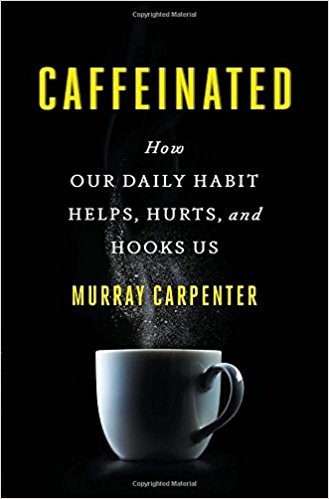 Caffeinated Murray Carpenter The most popular drug in America is a white powder. No, not that powder. This is caffeine in its most essential state. And Caffeinated reveals the little-known truth about this addictive, largely unregulated drug found in coffee, energy drinks, teas, colas, chocolate, and even pain relievers.
Caffeinated Murray Carpenter The most popular drug in America is a white powder. No, not that powder. This is caffeine in its most essential state. And Caffeinated reveals the little-known truth about this addictive, largely unregulated drug found in coffee, energy drinks, teas, colas, chocolate, and even pain relievers. " "
